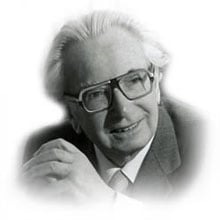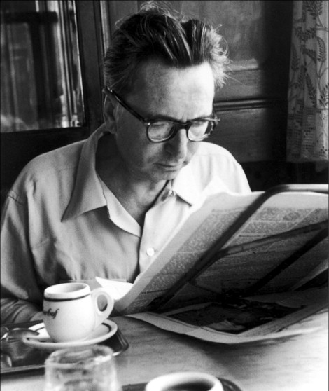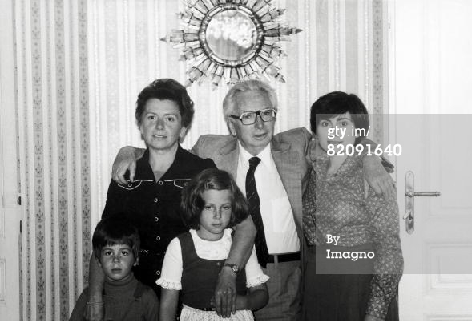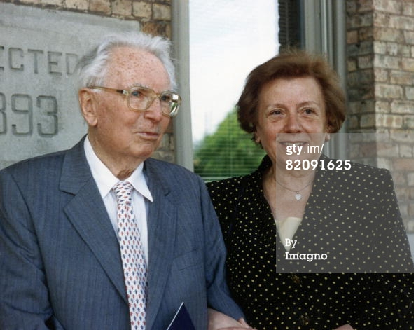 |
| Viktor Frankl (http://www.oidatherapy.org/articles/part_07c.htm) |
A phoenix, a legendary bird cloaked in flames that burn brighter than any star. Dark, intelligent eyes peer out from the inferno, inner depths set ablaze by the white-hot glare. It shrieks in agony as its own flames begin devouring it alive; it wavers then falls like a marionette with its strings snipped off. Wisps of smoke dance and curl around its steadily smoldering corpse. A tiny head bobs up from the pile of ashes, and the baby phoenix draws breath. It is featherless, flightless, feeble, and downright ugly-but alive. And that is all that matters. Much like aforementioned phoenix, Viktor Frankl endured a catastrophic event and came out better because of it. Frankl was a professor of Neurology and Psychiatry at the University of Vienna Medical School as well as a visiting professor at Harvard and other universities in San Diego, Pittsburgh, and Dallas. Born March 26, 1905, in Vienna Austria, he began writing letters to famous Viennese psychologists at a young age. As he grew up, he found himself disagreeing with their theories, and he decided to create his own. He began drafting a manuscript, only to be interrupted by the beginning of the Holocaust. The memories of his time in the concentration camps served to strengthen rather than weaken him, and he later became the founder of the Third Great Viennese School of Psychology, called "Logotherapy". He earned numerous awards because, according to the American Journal of Psychiatry, his work was "perhaps the most significant thinking since Freud and Adler." Frankl died of heart disease on September 2, 1997, in his birthplace. Because of his selflessness and indomitable optimism, Viktor Frankl not only survived a tragic incident, but also rebounded and came out a better person because of it, proving that Phoenixes are not just found in myths.
 |
| Viktor enjoying a quiet breakfast. (http://www.thelancet.com) |
By selflessly giving everything he had to offer, Frankl made the world a better place for others. While speaking at different Universities, Frankl imparted wisdom on young college students: "'The meaning of your life,' Frankl once explained, 'is to help others find the meaning of theirs.'" (Pyka). To dedicate one's life to helping others find meaning in their lives; that is not something most would do. But Frankl did exactly that. Frankl believed the words he spoke. He shared his ideas and inspired others with his character--his tenacity, his will to live, his courage and strength, his love of life, and his deep compassion. Now, one might argue that those are but empty words, fabricated in order to paint Frankl in a favorable light--a heroic martyr whom, even after everything he endured and suffered through, could still find it within his heart to give. One could say he was simply too good to be true, that no person of such noble character could possibly have existed in this dark world homo sapiens call home. Yet, he proved countless times through his actions that he was indeed "the real deal". Before the Holocaust began: "He becomes director of the Neurological Department of the Rothschild Hospital, a clinic for Jewish patients. In spite of the danger to his own life he sabotages Nazi procedures by making false diagnoses to prevent the euthanasia of mentally ill patients." (Victor Frankl Institut). He was willing to forfeit his life to save people he barely knew. He was near the peak of his career, already a director of a department; he had his whole life before him. Yet he was willing to throw all those away for the sake of "mentally ill patients" whom would not ever know of the sacrifice he made. He was not doing it for glory or recognition, but so he could better the lives of others. Frankl proved-not only through his words but also his actions-truly selfless people existed.
 |
| Frankl with second wife, daughter, and grandkids. (http://www.gettyimages.ie) |
Frankl's indomitable optimism kept him alive and kicking despite imminent threat to his life. It was this same optimism that allowed him to continue on with his life and become a wiser person. While being interviewed after the Holocaust, he explained what he had realized: "'Everything can be taken away from man but one thing-to choose one's attitude in a given set of circumstances, to choose one's own way,' he said, noting that what drove him to survive the terrible deprivation, exhaustion, sickness and brutality of the camps was the image he carried in his mind of his beloved wife and his hope for the future." (Huso). Frankl spent time in several concentration camps, including the infamous Auschwitz, a death camp where over one million people were killed--one third of the overall death count. And through it all, he managed to cling onto his hope, the thin, effervescent strand he kept buried close to his heart. He remained optimistic when faced with grim circumstances and a bleak future, choosing to suffer through each hour, each day rather than end his life like many did. In fact, in a camp called Thereisienstadt, he set up a suicide watch and created a unit to help newcomers overcome grief and shock. He was liberated from the camps after three grueling years, only to be struck down by a crushing blow; his parents, his brother, and his beloved wife had died in the camps. Rather than allowing himself to sink into depression, he instead used the experience to encourage himself, commenting that: "In a way I do pity these younger people who did not know the camps or live during the war, who have nothing like that to compare [their own hardship] with.... Even today, as I lose my sight or with any severe problem or adverse situation, I have only to think for a fraction of a second, and I draw a deep breath what I would have given then if I could have had no greater problem than I face today!"(Huso). Frankl managed to draw something positive from a negative experience, turning a weakness into a strength. He kept his head up and realized his experience allowed him a new insight into the world, and it was not necessarily all bad. He became aware of his own inner strength, and he took advantage of it, using it to boost his morale, along with the morale of those around him. His optimism enabled him to survive and move on after the Holocaust ended.
 |
| Viktor and his second wife Eleonore (http://www.gettyimages.com/) |
The Holocaust was the painful, yet cleansing fire Frankl endured. Though it was hard and at many times it seemed he wouldn't emerge alive, he managed to triumph in the end. True, he was weakened by the burns, but they allowed him new insights on the world and the meaning of life. Before the Holocaust, he was already a person of amazing character, completely selfless and unyieldingly optimistic. The Holocaust merely put him to the test, forcing out and magnifying his hidden traits. The stark struggle for life and all the moral dilemmas it entailed brought his heroic traits to the forefront. Frankl put it into his own words: "The way in which a man accepts his fate and all the suffering it entails, the way in which he takes up his cross, gives him ample opportunity.to add a deeper meaning to his life. He may remain brave, dignified and unselfish. Or in the bitter fight for self-preservation, he may forget his human dignity and become no more than an animal." (Man's Search for Meaning 88) Frankl definitely exemplifies the former. He believed in his own ideals and genuinely wanted to help others; his noble character shined through his actions, and anyone who has ever seen him, heard him, or read his words can tell. I know I can; it's awe-inspiring. Life-changing, even. His struggles, his thoughts, his actions, his renewal, they all remind us of pure human good. They remind us that even in our corrupt society, people such as he exists or once existed, vibrant and full of life, unwavering despite their trials. Frankl truly was a resplendent phoenix hidden in man's form; and a marvelous hero to boot!
 |
| A Phoenix's Circle of Life (http://web.njcu.edu/sites/tlc/Content/tlc_phoenix_) |
Works Consulted
Frankl, Viktor E. Man's Search for Meaning. Fourth ed. Boston: Beacon, 2006.Web. 10 Dec. 2012
Huso, Deborah. "Doctor for the soul: after surviving the Holocaust, Viktor Frankl brought the soul back
into Western medicine." Success May 2011: 60+. Gale Biography
"Man's Search for Ultimate Meaning." Publishers Weekly 22 Sept. 1997: 62. Gale
Biography In Context. Web. 11 Dec. 2012.
Pyka, Marcus. "Viktor Emil Frankl." Encyclopaedia Judaica. Ed. Michael Berenbaum and Fred Skolnik. 2nd ed.
Detroit: Macmillan Reference USA, 2007. Gale Biography In Context. Web. 11 Dec. 2012.
Ted.com. "Viktor Frankl: Why to Believe in Others." TED: Ideas worth Spreading. TED Conferences, LLC, n.d.
Web. 11 Dec. 2012. <http://www.ted.com/talks/viktor_frankl_youth_in_search_of_meaning.html>.
Victor Frankl Institut. "Life and Work: Chronology." VIKTOR FRANKL INSTITUT. Life and Work: Chronology.
Victor Frankl Institut, 1992. Web. 11 Dec. 2012. <http://www.viktorfrankl.org/e/chronology.html>.
Page created on 9/14/2013 12:00:56 PM
Last edited 1/6/2017 7:29:03 PM
